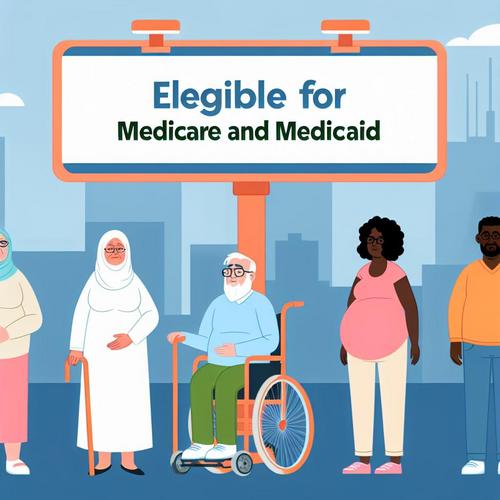Are you confused about the differences between Medicare and Medicaid? Don’t worry, you’re not alone! Let’s break it down in a simple and easy-to-understand way.
First off, let’s talk about Medicare. This is a federal health insurance program primarily for individuals aged 65 and older, as well as certain younger people with disabilities. It helps cover a wide range of medical services, from hospital stays to doctor visits to prescription drugs.
Now, on to Medicaid. This is a joint federal and state program that provides health coverage to low-income individuals, families, and children. It offers a variety of benefits, such as doctor visits, hospital stays, and long-term care services.
So, who is eligible for Medicare? Generally, individuals aged 65 and older qualify, as well as those with certain disabilities. You may also be eligible if you have end-stage renal disease (ESRD) or amyotrophic lateral sclerosis (ALS).
On the other hand, Medicaid eligibility is based on income and other factors. Each state has its own guidelines, but in general, low-income individuals, pregnant women, children, and people with disabilities may qualify for coverage.
It’s important to note that Medicare and Medicaid are two separate programs with different eligibility requirements and benefits. While some individuals may be eligible for both, they serve different populations and cover different services.
For more detailed information on the differences between Medicare and Medicaid, check out these resources: Medicare.gov, Medicaid.gov, Centers for Medicare & Medicaid Services, HealthCare.gov, Kaiser Family Foundation.
Eligibility for Medicare
Hey there! Let’s talk about Medicare eligibility. If you’re wondering if you qualify for this government program that provides healthcare coverage for seniors, people with certain disabilities, and those with end-stage renal disease, you’re in the right place!
So, who can enroll in Medicare? Well, there are a few different scenarios to consider:
- Age: If you’re 65 years old or older, you’re generally eligible for Medicare. You can enroll in Medicare Part A (hospital insurance) and Part B (medical insurance) during the Initial Enrollment Period, which starts three months before your 65th birthday and lasts for seven months.
- Disability: If you’re under 65 and have been receiving Social Security Disability Insurance (SSDI) for at least two years, you may qualify for Medicare.
- End-Stage Renal Disease: If you have permanent kidney failure requiring dialysis or a kidney transplant, you can also be eligible for Medicare, regardless of your age.
Keep in mind that there are different parts of Medicare, each covering different services, so it’s essential to understand your options and choose the coverage that best suits your needs.
If you’re not sure if you meet the eligibility criteria or if you have specific questions about enrolling in Medicare, don’t hesitate to reach out to a Medicare advisor for personalized guidance. They can help you navigate the enrollment process, understand your coverage options, and make informed decisions about your healthcare.
Remember, Medicare is a valuable resource that can provide you with access to essential healthcare services, so it’s essential to take advantage of this program if you qualify. Don’t miss out on the opportunity to secure comprehensive coverage for your medical needs as you age.
Stay informed, stay healthy, and reach out to trusted professionals for assistance along the way. Your health and well-being are worth it!
And there you have it – some key information about eligibility for Medicare. Keep exploring and learning more about this program to make the most of the benefits it offers. Take care!
Find Medicare Plans in 3 Easy Steps
We can help get up to $0 monthly premium Medicare plans
Qualifications for Medicaid
Hey there! Let’s talk about Medicaid qualifications. This program provides health coverage for low-income individuals and families, including children, pregnant women, seniors, and people with disabilities. If you fall into one of these categories, you may be eligible for Medicaid.
Income Level
One of the main qualifications for Medicaid is your income level. Each state has its own guidelines for income eligibility, so it’s essential to check with your state’s Medicaid office to see if you qualify. Typically, individuals and families with incomes below a certain threshold are eligible for Medicaid.
Age and Disability
Medicaid also provides coverage for individuals with disabilities, regardless of their income level. If you have a disability, you may qualify for Medicaid benefits to help cover your healthcare costs. Additionally, Medicaid offers coverage for seniors who may not be eligible for Medicare or who need additional assistance with their healthcare expenses.
Family Status
Family status can also play a role in determining Medicaid eligibility. Pregnant women, children, and parents or caregivers of dependent children may qualify for Medicaid based on their family status. It’s crucial to provide accurate information about your family size and composition when applying for Medicaid to ensure you receive the proper coverage.
Citizenship and Residency
To qualify for Medicaid, you must be a U.S. citizen or a qualified immigrant. Additionally, you must be a resident of the state where you are applying for Medicaid coverage. Proof of citizenship and residency may be required when applying for Medicaid benefits, so be sure to have these documents on hand when you start the application process.
Remember, Medicaid is a vital program that helps millions of Americans access quality healthcare services. If you think you may be eligible for Medicaid based on your income, age, disability, family status, citizenship, and residency, don’t hesitate to apply. It’s worth exploring your options to see if you qualify for this essential health coverage.
And if you need help navigating the Medicaid application process or determining your eligibility, don’t hesitate to reach out to your local Medicaid office or a Medicaid advisor. They can provide valuable guidance and support to help you access the healthcare services you need.
Alright, let’s dive into the differences between Medicare and Medicaid! These two programs are often confused, but they serve different purposes and have different eligibility requirements.
Medicare is a federal health insurance program that primarily serves individuals aged 65 and older, as well as some younger individuals with disabilities. It is divided into four parts: Part A covers hospital stays, Part B covers medical services like doctor visits, Part C (also known as Medicare Advantage) offers alternative ways to receive Medicare benefits through private insurance plans, and Part D covers prescription drugs.
On the other hand, Medicaid is a joint federal and state program that provides health coverage to low-income individuals and families. Each state has its own set of eligibility requirements and benefits, so it’s important to check with your state’s Medicaid office to see if you qualify.
One of the key differences between Medicare and Medicaid is their funding sources. Medicare is funded by the federal government through payroll taxes, while Medicaid is funded jointly by the federal government and individual states. This means that Medicaid eligibility and benefits can vary depending on where you live.
Another important distinction is the scope of coverage. Medicare is generally available to individuals over 65 and those with certain disabilities, regardless of income. On the other hand, Medicaid is based on financial need, so you must meet income and asset requirements to qualify for benefits.
It’s crucial to understand the differences between these two programs so that you can make informed decisions about your healthcare coverage. If you’re unsure about which program you qualify for, it’s always a good idea to seek guidance from a healthcare professional or insurance advisor. They can help you navigate the complex world of healthcare insurance and ensure that you get the coverage you need.
Remember, healthcare is a critical aspect of your overall well-being, so don’t hesitate to reach out for help if you need it. By understanding the differences between Medicare and Medicaid, you can make the best choice for your individual circumstances and ensure that you have access to the care you need.
So, whether you’re approaching retirement age or simply looking for affordable healthcare options, take the time to explore your options and find the program that works best for you. Your health is worth it!
Find Medicare Plans in 3 Easy Steps
We can help get up to $0 monthly premium Medicare plans
Heading V: Special Cases for Medicare and Medicaid
Hey there! Today, let’s dive into the world of Medicare and Medicaid and explore some special cases where these programs can provide essential healthcare coverage. Whether you’re a senior citizen, a person with disabilities, or facing financial challenges, there are options available to ensure you receive the care you need.
Medicare and Medicaid are both government-sponsored programs designed to help individuals access healthcare services. While Medicare primarily covers individuals aged 65 and older, as well as those with certain disabilities, Medicaid is geared towards low-income individuals and families.
But what about those who fall into unique circumstances? Here are some special cases where Medicare and Medicaid can provide crucial assistance:
1. Dual Eligibility: Some individuals may qualify for both Medicare and Medicaid, known as “dual eligibility”. This means they can access benefits from both programs to cover a broader range of healthcare services. If you meet the criteria for both programs, you can enjoy comprehensive coverage that addresses your specific healthcare needs.
2. Long-Term Care: Medicare provides limited coverage for long-term care services, such as nursing home care. However, Medicaid offers more extensive coverage for long-term care for those who meet specific income and asset requirements. If you require ongoing assistance with daily activities due to a chronic illness or disability, Medicaid can help cover the costs of long-term care services.
3. Medically Needy Individuals: Some individuals may have high medical expenses that exceed their income, making it challenging to afford healthcare services. Medicaid offers a “medically needy” program for individuals who meet income requirements but have high medical expenses. This program allows individuals to “spend down” their excess income on medical bills to qualify for Medicaid coverage.
4. Children with Special Needs: Children with disabilities or special healthcare needs may require additional support and services to thrive. Medicaid provides comprehensive coverage for children with special needs, including access to therapies, medical equipment, and other essential services. If you have a child with disabilities, Medicaid can help ensure they receive the care they need to reach their full potential.
5. Transitions in Care: When transitioning from one healthcare setting to another, such as from a hospital to a nursing home, coordinating care can be challenging. Medicare and Medicaid offer programs to help individuals navigate these transitions smoothly and ensure they continue to receive the necessary care and support throughout the process.
Navigating the world of healthcare can be overwhelming, especially when facing unique circumstances. That’s why it’s essential to understand the special cases where Medicare and Medicaid can provide vital assistance. By exploring these options and seeking guidance from healthcare advisors, you can access the care you need to lead a healthy and fulfilling life.
Remember, you don’t have to navigate this journey alone. Reach out to Medicare advisors and healthcare professionals who can help you understand your options and guide you through the process of accessing essential healthcare coverage. Your health and well-being are important, and there are resources available to support you every step of the way.
So, you’ve decided that you’re ready to apply for Medicare and Medicaid – but where do you start? Don’t worry, we’ve got you covered! Applying for these programs can seem overwhelming, but with the right guidance, the process can be much smoother and stress-free.
How to Apply for Medicare and Medicaid
When it comes to applying for Medicare, there are a few different options available to you. The most common way to apply is through the Social Security Administration (SSA). You can apply online, over the phone, or in person at your local SSA office. Make sure to have your personal information handy, such as your Social Security number, birth certificate, and proof of income.
If you’re looking to apply for Medicaid, the process can vary depending on your state. In most cases, you can apply through your state’s Medicaid agency or through the Health Insurance Marketplace. Again, make sure to have all necessary documents ready, such as proof of income, residency, and citizenship.
It’s important to note that you may be eligible for both Medicare and Medicaid, known as “dual eligibility.” If this is the case, you can apply for both programs separately or through a program called Medicare Savings Programs, which can help cover some of the costs associated with Medicare.
When applying for Medicare and Medicaid, it’s crucial to be thorough and accurate with your information. Any mistakes or missing documents can delay the process, so double-check everything before submitting your application.
Remember, the application process for these programs can be complex, and it’s okay to seek help if you need it. There are resources available to assist you, such as Medicare Advisors, who can guide you through the process and answer any questions you may have.
By choosing Medicare Advisors for your insurance needs, you can rest assured that you’re in good hands. Their team of experts can help you navigate the intricacies of Medicare and Medicaid, ensuring that you get the coverage you need at a price you can afford.
So, don’t let the application process intimidate you. With the right support and guidance, applying for Medicare and Medicaid can be a straightforward and positive experience. Take the first step towards securing your health coverage today!
Find Medicare Plans in 3 Easy Steps
We can help get up to $0 monthly premium Medicare plans
So, you’ve made the decision to explore your Medicare and Medicaid options, but where do you go from here? That’s where Medicare Advisors come in to save the day!
Medicare Advisors are your go-to experts for all things related to Medicare and Medicaid. They’re like your personal insurance gurus, ready to guide you through the often confusing and overwhelming process of choosing the right plan for your needs.
Why Choose Medicare Advisors for Your Insurance Needs
First and foremost, Medicare Advisors are knowledgeable professionals who understand the ins and outs of the Medicare and Medicaid programs. They can explain the various plans and options available to you in a way that is easy to understand, helping you make informed decisions about your healthcare coverage.
Not only do Medicare Advisors have the expertise to help you navigate the complexities of Medicare and Medicaid, but they also have access to a wide range of insurance carriers and plans. This means that they can shop around on your behalf, finding the plan that best fits your needs and budget.
When you work with a Medicare Advisor, you can rest assured that you are getting personalized attention and support throughout the entire process. They will take the time to get to know you and your healthcare needs, ensuring that you are matched with the right plan for you.
But perhaps the most valuable aspect of working with a Medicare Advisor is the peace of mind that comes with knowing you have someone in your corner, advocating for your best interests. They will be there to answer your questions, address your concerns, and provide ongoing support as you navigate the world of Medicare and Medicaid.
Choosing the right Medicare or Medicaid plan is a big decision, and it can be overwhelming to navigate the process on your own. That’s why enlisting the help of a Medicare Advisor is a smart move. They can simplify the process, provide expert guidance, and ultimately help you find the best plan for your unique needs.
So, if you’re ready to take the next step in securing your healthcare coverage, reach out to a Medicare Advisor today. With their expertise and support, you can rest easy knowing that you have the right plan in place to protect your health and well-being.






